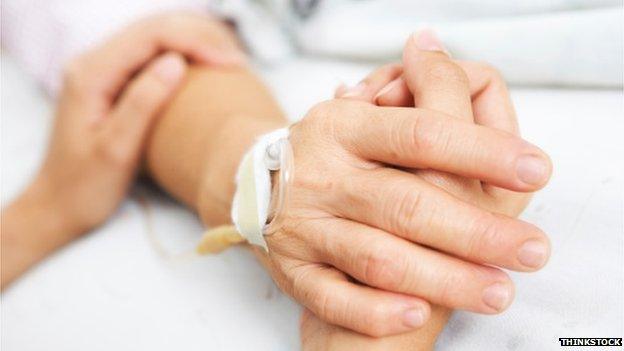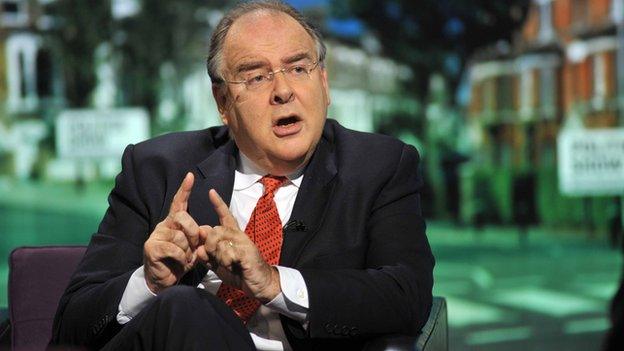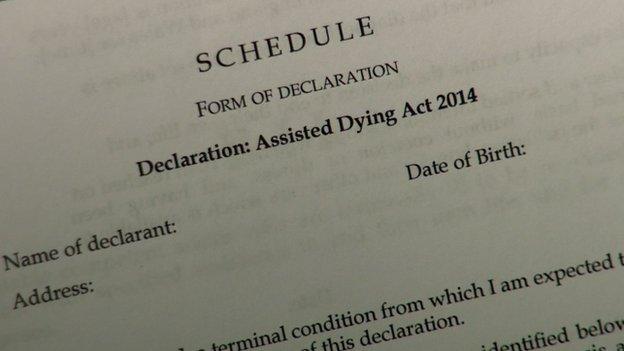Assisted dying: What do disabled people think?
- Published

The Assisted Dying Bill is due to receive a second reading in the House of Lords on Friday. As has been demonstrated this week, it's a divisive issue, and can be confusing.
While some say it's a simple argument about choice, others, including many with disabilities, say it has much wider implications.
Campaign groups such as Dignity in Dying who agree with Lord Falconer, who introduced the Bill to the Lords, are keen to point out that public support is very firmly on their side.
And others, including Sarah Wooton, chief executive of Dignity in Dying, says 79% of disabled people support a change in the law.
The figure she quotes is from a poll commissioned by her organisation in which YouGov surveyed 1,036 disabled people. It's potentially confusing because a survey from the disability charity Scope reports a quite different story: "70% of disabled people are concerned about pressure being placed on other disabled people to end their lives prematurely, if there were a change in the law." So which of the surveys do we buy into?
Actor Liz Carr is keen to highlight that people already have the choice and it's not against the law to take one's own lives. Carr has a disability herself and, along with many organisations of disabled people in the UK, does not support assisted dying.

Lord Falconer is keen to point out that public support is on his side when it comes to assisted dying
Those against are concerned that, if passed, the bill would have a negative impact on the most disabled and vulnerable in our society.
Dignity in Dying are clear to point out that they advocate assisted dying - where terminally ill yet mentally competent people take prescribed medication to end their life. It's not assisted suicide, voluntary euthanasia or euthanasia. They're not the same thing. They've also said to me that this issue is not about disabled people.
Disability campaigners such as Baroness Jane Campbell say it's a "dangerous time" to consider any change to the law. She says that the economic downturn and austerity has led to a serious hardening of attitudes towards vulnerable members of society, with pensioners and disabled people being routinely branded as "scroungers" or accused of being a "burden".
She argues that in the current climate, relaxing the law on assisted suicide would be like an open invitation to those with something to gain from pressuring them into ending their lives.
Last weekend wasn't too positive for those like Baroness Campbell who are against the bill, with Desmond Tutu and former Archbishop of Canterbury Lord Carey showing support for assisted dying for those with a terminal illness.
Of all the evidence, Lord Carey said the Tony Nicklinson case had "exerted the deepest influence on him".
This was, once again, a little confusing. Nicklinson's case was desperately sad but he would not have qualified for an assisted death because he was not terminally ill.

Those who are in favour of the bill have made quite an impact, but what about those who are against, like Pamn who has motor neurone disease (MND)?
Pam can only communicate by using technology which she controls by moving her eyes. Although some may look at her and think, "if that were me, I'd want the choice to end my life," Pam most certainly doesn't want to die, or for the bill to be passed.
She told me: "People may assume that all disabled people don't have a good quality of life and would want to die. I am concerned that if assisted dying became law, then people would look at me and ask why I am alive and not asking to be killed."
Pam's case also throws up the dangers of diagnoses. She was diagnosed with MND, a severely life-shortening condition for most people, but 20 years later she's still watching films and box-sets (she's currently obsessed with True Detective), reading books and asking me for smoothie recipes.
No one can predict what's going to happen on Friday, all we know is that a record number of peers have registered to speak and that this issue is complex, and whether you're for or against, it's a subject that invokes passion on both sides.
Follow @BBCOuch, external on Twitter and on Facebook, external, and listen to our monthly talk show